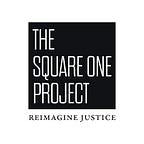The Not-So-Secret Secret About Crime and Politics
By Katharine Huffman, Executive Director, The Square One Project
In the lead up to last Election Day, many candidates, fearing tighter races than expected, turned to an old standby in politics: scaring voters about crime. And it largely bombed. In the tightest races, voters made abortion rights, extremism and “candidate quality” the deciding factors, not taking the bait on what was a fairly predictable, largely racist and generally schlocky effort around law and order.
While the American people put safety first for their families, they also see through 30-second ads and debate soundbites that are less about a fair and accurate application of the law for everyone and more about demonizing Black and Brown people.
The calculated political demagoguery may not have worked as planned on November 8 but these plots have an equally insidious effect on every other day, with a potential for deepened racial strife and increased impunity for police brutality. It’s a descent into a dark and dangerous pit that is hard to climb out of, especially when so many people are cast as villains and our country gets further divided.
Now, with the midterms in the rearview mirror and the cynical “crime ploy” in the trash bin, there is actually a path forward that can make us safer, move away from racism and ensure greater justice for millions of people.
You see, the not-so-secret secret about crime and politics is that people across the political spectrum agree that our system of mass incarceration isn’t working. That has led to actual bipartisan cooperation on fixing some of the most egregious, racist and counterproductive “law and order” policies. And it creates a starting point for foundational change.
Over the past decade or so, conservatives and progressives came together to enact reforms like the elimination of cash bail, marijuana arrests, and court-ordered fines and fees. These changes were found to have no adverse effect on crime, and they in fact may have mitigated it. These efforts were embraced by leaders as far apart as Newt Gingrich and Van Jones and Elizabeth Warren and Jeb Bush.
It may seem a little Jekyll and Hyde for criminal justice politics to swing so wildly from demonization to cooperation and back to demonization. But we’re more likely to see Jekyll if voters keep rejecting Hyde.
A crucial step is reframing the false choice that’s currently presented to voters: that you can have safety or you can have justice, but you can’t have both. The truth is, justice and safety aren’t mutually exclusive; they are mutually dependent.
A new kind of criminal justice policy has safety at its core. For example, anti-violence initiatives organized by local groups have trained people with experience inside the justice system — called street outreach workers — to interrupt the cycles of violence that can flare among young men at high risk of being shot or shooting others.
Researchers have found that innovative local programs are a promising strategy for stemming shootings and reducing homicide rates. And these programs have found their way into major policy proposals.
New research also shows that fighting poverty and other root causes of crime can also significantly improve safety. Investments in community based organizations reduces crime and improves health and wellness.
It’s also just common sense: if we invest in education, health care and jobs, we inject hope and increase economic freedom into people’s lives. And it has always been the case that when more people thrive, fewer people commit crimes and suffer from violence.
And the good news is that there’s a strong history of Democratic and Republican solutions to help invest in families, from tax credits to investments in housing and schools.
It may be naive to expect every politician to embrace an approach that would neutralize a political weapon that’s been generally useful to them, even in tougher elections. But it’s time for them to learn the lessons that recent elections have taught us: the tropes of “tough on crime” and the demonization of Black and Brown people — Black and Brown voters — no longer pay off at the ballot box.
